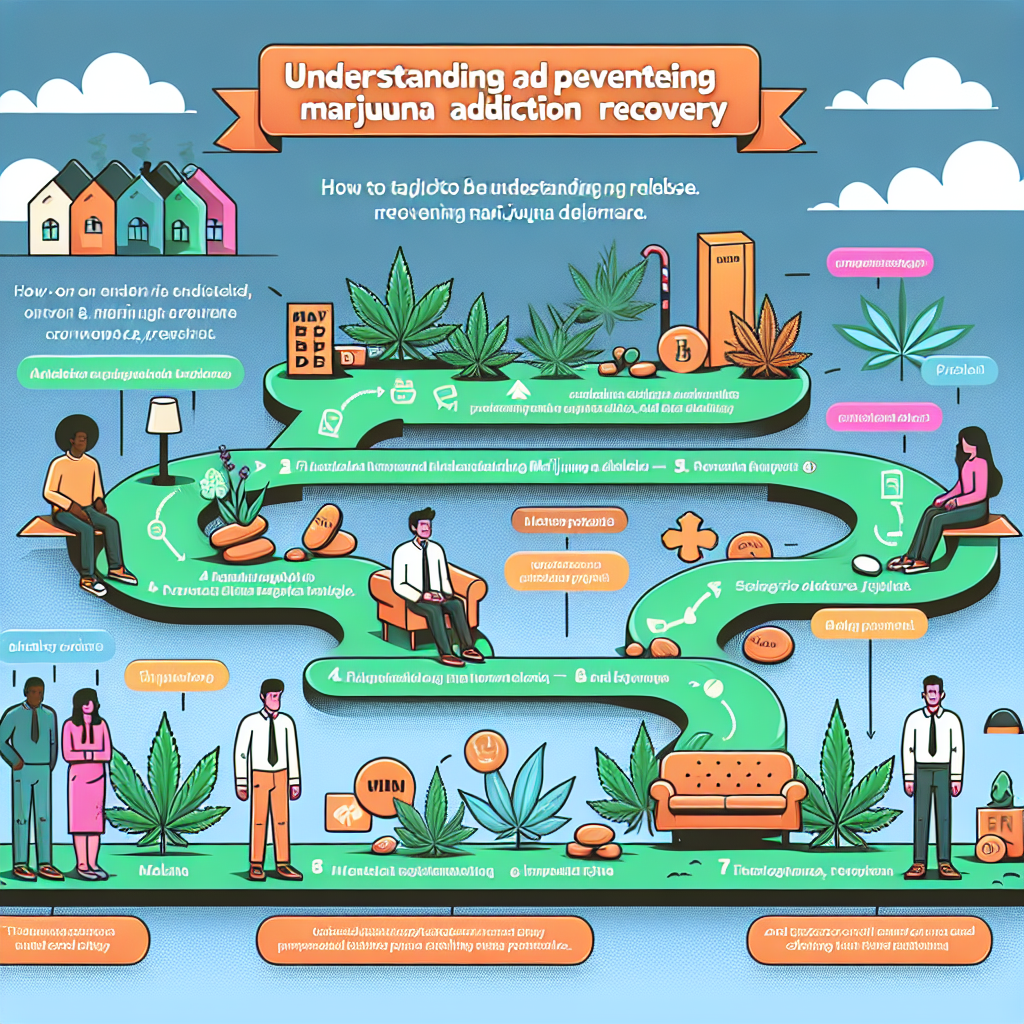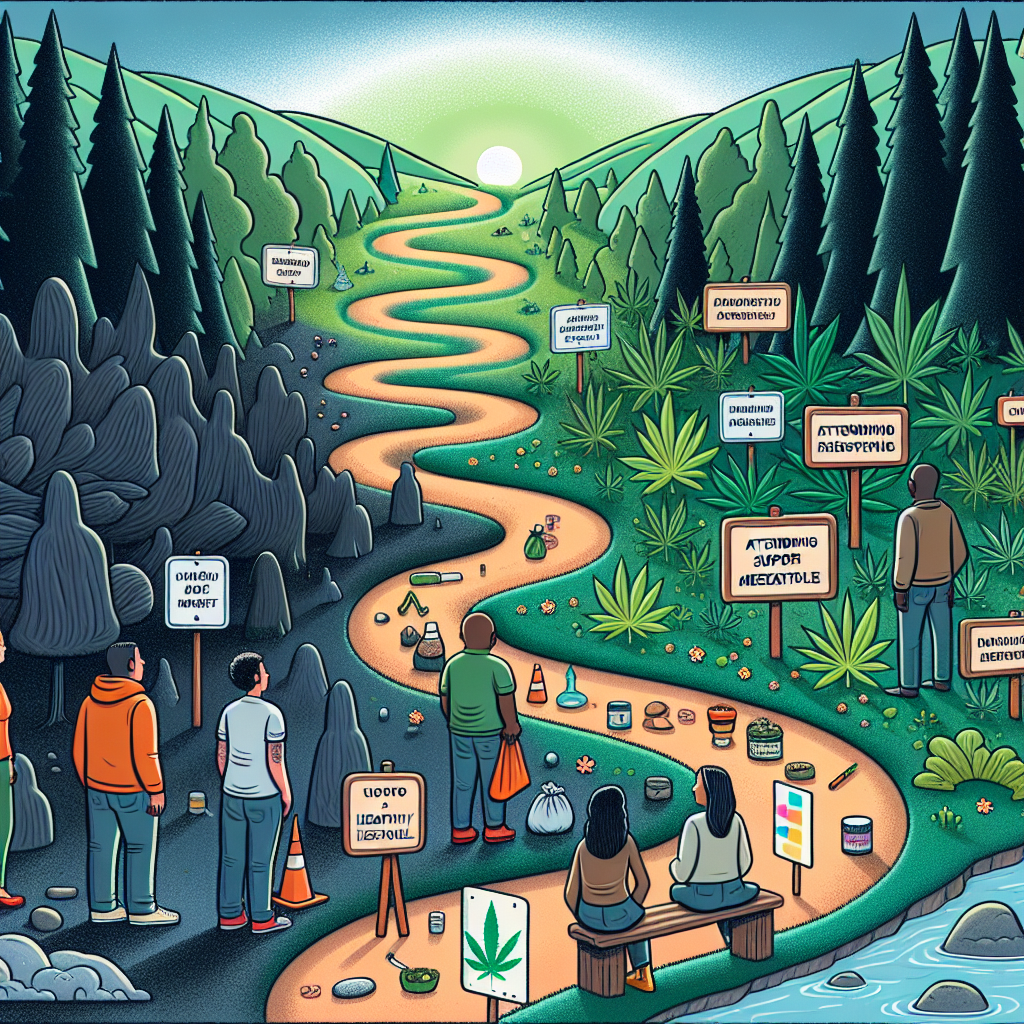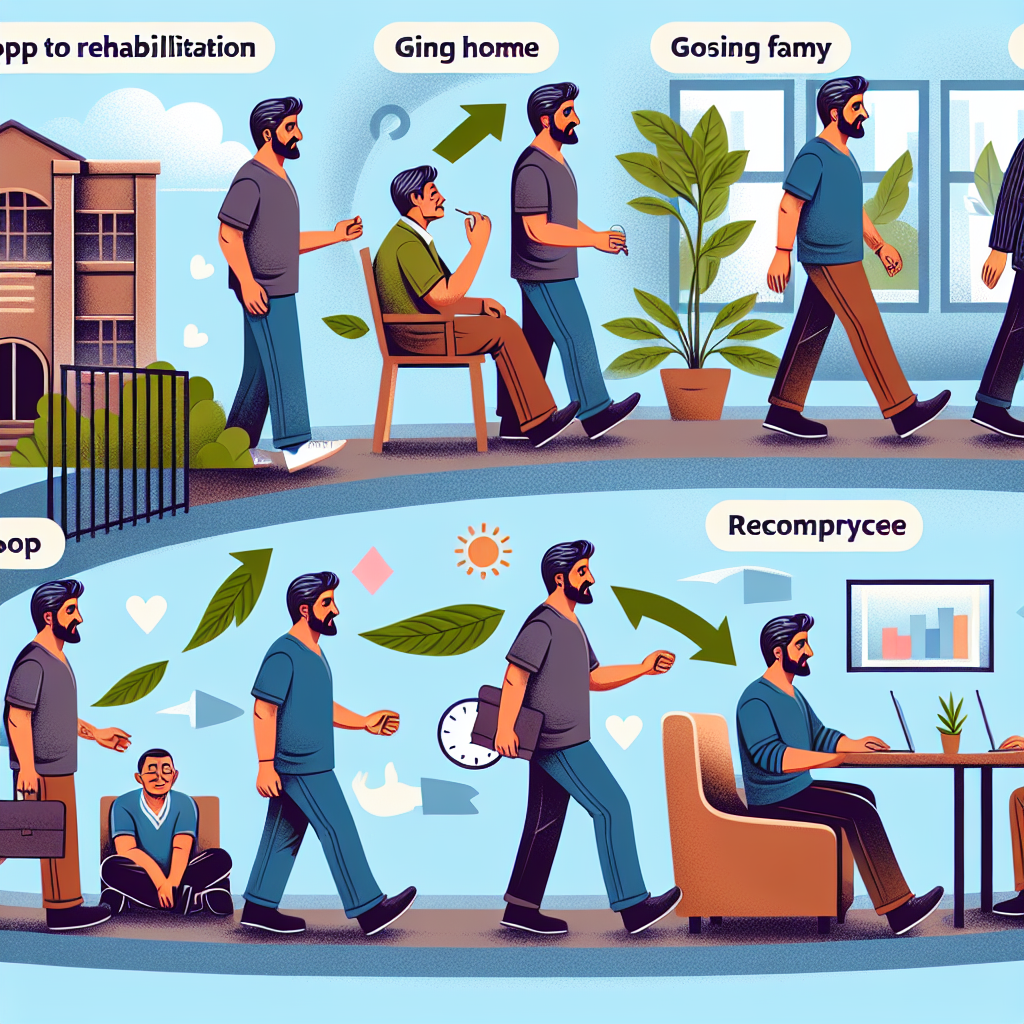-
Table of Contents
“Empower Recovery: Understanding and Preventing Relapse in Marijuana Addiction”
Introduction

Understanding and preventing relapse in marijuana addiction recovery is crucial for individuals striving to maintain long-term sobriety. Relapse, a common challenge in the recovery process, occurs when a person returns to substance use after a period of abstinence. This phenomenon can be triggered by various factors, including stress, environmental cues, and emotional distress. To effectively prevent relapse, it is essential to recognize the signs and develop coping strategies. Comprehensive relapse prevention plans often incorporate behavioral therapies, support groups, and lifestyle changes to address the underlying causes of addiction and promote resilience. By understanding the dynamics of relapse and implementing proactive measures, individuals can enhance their chances of sustained recovery and overall well-being.
Identifying Triggers in Marijuana Addiction Recovery
Understanding and preventing relapse in marijuana addiction recovery is a multifaceted process that requires a deep understanding of the triggers that can lead to a setback. Identifying these triggers is a crucial step in maintaining long-term sobriety and achieving a healthier, more fulfilling life. Triggers can be broadly categorized into emotional, environmental, and social factors, each playing a significant role in the recovery journey.
Emotional triggers are often the most challenging to identify and manage. Feelings of stress, anxiety, depression, or even boredom can create a powerful urge to use marijuana as a coping mechanism. It is essential to develop healthy emotional regulation strategies to combat these triggers. Techniques such as mindfulness meditation, cognitive-behavioral therapy, and regular physical exercise can help individuals manage their emotions more effectively. By recognizing the emotional states that lead to cravings, individuals can take proactive steps to address these feelings in healthier ways.
Environmental triggers are another significant factor in relapse. These can include specific places, situations, or even objects that are associated with past marijuana use. For instance, walking past a park where one used to smoke or seeing paraphernalia can evoke strong memories and cravings. To mitigate these triggers, it is beneficial to create a new environment that supports sobriety. This might involve rearranging living spaces, avoiding certain locations, or even moving to a new area if necessary. Additionally, engaging in new hobbies and activities can provide positive distractions and reduce the likelihood of encountering environmental triggers.
Social triggers are equally important to consider. The influence of friends, family, and social circles can either support or hinder recovery efforts. Being around individuals who use marijuana or who do not support sobriety can be a significant risk factor for relapse. It is crucial to build a supportive network of people who understand and respect the recovery process. This might mean distancing oneself from certain relationships and seeking out new connections through support groups, therapy, or community activities. Surrounding oneself with positive influences can provide the encouragement and accountability needed to stay on track.
In addition to identifying and managing these triggers, it is essential to develop a comprehensive relapse prevention plan. This plan should include specific strategies for dealing with cravings, such as having a list of supportive contacts to call, engaging in physical activity, or practicing relaxation techniques. It is also helpful to set clear, achievable goals and to celebrate milestones along the way. By having a structured plan in place, individuals can feel more prepared and confident in their ability to maintain sobriety.
Moreover, ongoing education about the nature of addiction and recovery can empower individuals to make informed decisions. Understanding that relapse is a common part of the recovery journey and not a sign of failure can help reduce feelings of shame and guilt. Instead, viewing relapse as an opportunity to learn and grow can foster resilience and determination.
In conclusion, identifying triggers in marijuana addiction recovery is a vital component of preventing relapse. By understanding and addressing emotional, environmental, and social factors, individuals can create a supportive framework for long-term sobriety. With the right strategies and a positive mindset, it is possible to overcome these challenges and build a healthier, more fulfilling life.
Strategies for Preventing Relapse in Marijuana Addiction
Preventing relapse in marijuana addiction recovery is a multifaceted endeavor that requires a combination of self-awareness, support systems, and proactive strategies. Understanding the triggers and developing coping mechanisms are crucial steps in maintaining sobriety. One of the first strategies involves recognizing the situations, emotions, or environments that may lead to a relapse. These triggers can be as varied as stress, social settings, or even certain times of the day. By identifying these triggers, individuals can develop a plan to avoid or manage them effectively.
Another essential strategy is building a robust support network. This network can include family, friends, support groups, or professional counselors. Having a reliable support system provides a safety net, offering encouragement and accountability. Support groups, such as Narcotics Anonymous or specialized marijuana addiction groups, can be particularly beneficial. These groups provide a sense of community and shared experience, which can be incredibly motivating and reassuring.
In addition to external support, internal coping mechanisms are equally important. Mindfulness and meditation practices can help individuals stay grounded and focused on their recovery goals. These practices encourage self-reflection and emotional regulation, making it easier to navigate challenging situations without resorting to marijuana use. Regular physical activity is another effective strategy. Exercise releases endorphins, which can improve mood and reduce stress, thereby decreasing the likelihood of relapse.
Setting realistic and achievable goals is also vital in preventing relapse. These goals can be related to personal development, career aspirations, or health improvements. By focusing on positive outcomes and celebrating small victories, individuals can maintain a sense of purpose and motivation. It is also helpful to keep a journal to track progress and reflect on the journey. Writing down thoughts and feelings can provide clarity and reinforce commitment to sobriety.
Another critical aspect is developing healthy routines and habits. Structure and consistency can provide a sense of stability and predictability, which can be comforting during the recovery process. This might include regular meal times, sleep schedules, and planned activities. Engaging in hobbies and interests can also provide a constructive outlet for energy and creativity, reducing the temptation to use marijuana.
Education and awareness play a significant role in preventing relapse. Understanding the effects of marijuana on the brain and body can reinforce the decision to stay sober. Knowledge about the long-term benefits of sobriety, such as improved mental health, better relationships, and enhanced cognitive function, can serve as powerful motivators. Additionally, staying informed about new research and recovery techniques can provide fresh insights and strategies.
It is also important to address any co-occurring mental health issues. Conditions such as anxiety, depression, or PTSD can complicate recovery and increase the risk of relapse. Seeking professional help to manage these conditions can create a more stable foundation for sobriety. Therapy, medication, or a combination of both may be necessary to achieve optimal mental health.
Lastly, practicing self-compassion and patience is crucial. Recovery is a journey with ups and downs, and setbacks are a natural part of the process. Instead of viewing a relapse as a failure, it can be seen as an opportunity to learn and grow. By treating oneself with kindness and understanding, individuals can build resilience and continue moving forward on their path to recovery.
In conclusion, preventing relapse in marijuana addiction recovery involves a comprehensive approach that includes recognizing triggers, building support networks, developing coping mechanisms, setting goals, creating routines, staying educated, addressing mental health issues, and practicing self-compassion. By integrating these strategies, individuals can enhance their chances of maintaining long-term sobriety and leading fulfilling lives.
The Role of Support Systems in Marijuana Addiction Recovery
In the journey of marijuana addiction recovery, the role of support systems cannot be overstated. These networks of care, understanding, and encouragement are often the bedrock upon which individuals build their new, substance-free lives. As one navigates the complex path of recovery, the presence of a robust support system can make the difference between relapse and sustained sobriety. Understanding the dynamics of these support systems and how they contribute to preventing relapse is crucial for anyone involved in the recovery process.
First and foremost, support systems provide emotional stability. The process of overcoming addiction is fraught with emotional highs and lows. Feelings of guilt, shame, and anxiety are common, and without a supportive network, these emotions can become overwhelming. Friends, family, and support groups offer a safe space for individuals to express their feelings without judgment. This emotional outlet is essential for maintaining mental health and resilience, which are critical components in preventing relapse.
Moreover, support systems offer practical assistance. Recovery often requires significant lifestyle changes, such as finding new hobbies, avoiding old triggers, and sometimes even changing one’s social circle. Supportive friends and family can help facilitate these changes by offering companionship in new activities, helping to identify and avoid triggers, and providing a sense of normalcy and routine. This practical support can ease the transition into a new way of living, making it less daunting and more manageable.
In addition to emotional and practical support, accountability is another vital aspect provided by support systems. When individuals know that others are invested in their recovery, they are more likely to stay committed to their goals. Regular check-ins with a sponsor, therapist, or support group can help keep individuals on track. These accountability measures serve as reminders of the progress made and the goals yet to be achieved, reinforcing the commitment to sobriety.
Furthermore, support systems can offer valuable insights and shared experiences. Engaging with others who have faced similar struggles can be incredibly empowering. Hearing stories of success and learning about the strategies others have used to overcome challenges can provide new perspectives and coping mechanisms. This shared wisdom can be a powerful tool in preventing relapse, as it equips individuals with a broader range of strategies to handle cravings and stress.
It is also important to recognize that support systems are not static; they evolve as the individual progresses in their recovery journey. Initially, the support might be more intensive, involving frequent meetings and constant check-ins. As the individual gains confidence and stability, the nature of the support may shift to a more as-needed basis. This flexibility ensures that the support system remains relevant and effective throughout the different stages of recovery.
In conclusion, the role of support systems in marijuana addiction recovery is multifaceted and indispensable. They provide emotional stability, practical assistance, accountability, and shared wisdom, all of which are crucial in preventing relapse. By fostering a strong network of support, individuals can navigate the challenges of recovery with greater confidence and resilience. The journey to sobriety is undoubtedly challenging, but with the right support system, it becomes a path filled with hope, strength, and the promise of a healthier future.
Coping Mechanisms for Long-Term Marijuana Abstinence
Achieving long-term abstinence from marijuana is a significant milestone in the journey of recovery, but maintaining this state requires ongoing effort and effective coping mechanisms. Understanding the nature of relapse and developing strategies to prevent it are crucial for sustaining a drug-free life. Relapse is often a part of the recovery process, but it does not signify failure. Instead, it can be an opportunity to learn and strengthen one’s resolve. By adopting a proactive approach, individuals can equip themselves with the tools necessary to navigate the challenges of long-term abstinence.
One of the most effective coping mechanisms is building a strong support network. Surrounding oneself with understanding and supportive individuals can provide the encouragement needed to stay on track. This network can include family, friends, support groups, or a therapist. Engaging in regular meetings with a support group, such as Marijuana Anonymous, can offer a sense of community and shared experience, which is invaluable during difficult times. Additionally, therapy can help address underlying issues that may contribute to substance use, providing a safe space to explore emotions and develop healthier coping strategies.
Another essential aspect of maintaining long-term abstinence is developing healthy routines and habits. Establishing a structured daily schedule can reduce the likelihood of boredom or idle time, which are common triggers for relapse. Incorporating regular physical activity, such as exercise or yoga, can improve mental and physical health, reducing stress and anxiety. Engaging in hobbies and activities that bring joy and fulfillment can also serve as a positive distraction and a source of motivation.
Mindfulness and meditation practices can be powerful tools in managing cravings and emotional distress. These practices encourage individuals to stay present and observe their thoughts and feelings without judgment. By cultivating mindfulness, one can develop greater self-awareness and emotional regulation, making it easier to cope with triggers and cravings. Meditation can also promote relaxation and reduce stress, which are often underlying factors in substance use.
It is also important to recognize and avoid high-risk situations that may lead to relapse. This may involve making changes to one’s social circle or avoiding environments where marijuana use is prevalent. Being aware of personal triggers, such as certain people, places, or emotions, can help individuals make informed decisions and take preventive measures. Developing a relapse prevention plan, which includes strategies for dealing with cravings and high-risk situations, can provide a sense of preparedness and confidence.
In addition to these strategies, self-compassion and patience are vital components of the recovery process. It is essential to acknowledge that setbacks may occur and to approach them with a mindset of learning and growth. Rather than viewing a relapse as a failure, it can be seen as an opportunity to reassess and strengthen one’s coping mechanisms. Celebrating small victories and progress, no matter how minor they may seem, can boost morale and reinforce the commitment to a drug-free life.
Ultimately, the journey to long-term marijuana abstinence is a continuous process that requires dedication and resilience. By building a strong support network, establishing healthy routines, practicing mindfulness, avoiding high-risk situations, and cultivating self-compassion, individuals can develop effective coping mechanisms to sustain their recovery. Each step taken towards maintaining abstinence is a testament to one’s strength and determination, paving the way for a healthier and more fulfilling life.
Q&A
1. **What are common triggers for relapse in marijuana addiction recovery?**
– Common triggers include stress, social situations where marijuana is present, emotional distress, and exposure to environments or people associated with past use.
2. **How can mindfulness techniques help in preventing relapse?**
– Mindfulness techniques can help individuals become more aware of their thoughts and cravings, allowing them to manage and reduce the intensity of these urges without acting on them.
3. **What role does a support network play in preventing relapse?**
– A strong support network provides emotional support, accountability, and encouragement, which can help individuals stay committed to their recovery goals and navigate challenges.
4. **Why is it important to have a structured routine during recovery?**
– A structured routine helps individuals establish healthy habits, reduce idle time that could lead to cravings, and create a sense of stability and purpose, all of which are crucial for maintaining sobriety.
Conclusion
Understanding and preventing relapse in marijuana addiction recovery involves recognizing the multifaceted nature of addiction, which includes psychological, social, and biological components. Effective relapse prevention strategies include comprehensive education about triggers, development of coping mechanisms, and ongoing support through therapy and support groups. Additionally, fostering a healthy lifestyle, including regular exercise, proper nutrition, and stress management, can significantly reduce the risk of relapse. Continuous monitoring and adjustment of recovery plans are essential to address evolving challenges and maintain long-term sobriety.



